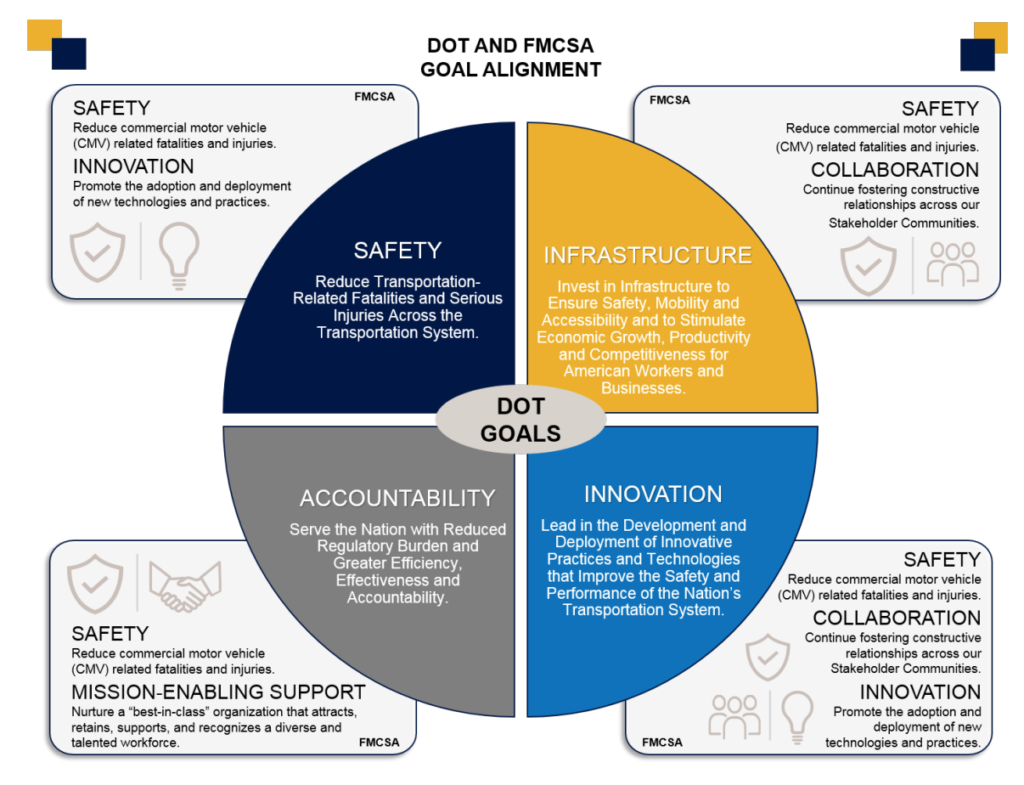The Federal Motor Carrier Safety Administration is the lead federal government agency responsible for regulating and providing safety oversight of commercial motor vehicles (CMVs), including more than 500,000 commercial trucking companies, more than 4,000 interstate bus companies, and more than four million commercial driver’s license (CDL) holders.
“FMCSA’s MISSION is to save lives and reduce crashes and injuries by advancing large truck and bus safety through collaboration, education, research, technology, and compliance.”
With the rising cost of implementing safety protocols and training programs, one great way to keep your team up to speed with your core initiatives is by providing materials that reinforce ideas around safety, organization, sustainable growth, and alignment with the goals of your company.
A lot of companies worry about working with the FMCSA, but their role in regulating transportation companies has been well documented. For example, In a recent statement by the Federal Motor Carrier Safety Administration, they stated that their mission was to help motor carriers reach their destinations safely through:
- Community outreach and education
- Enforcing compliance requirements through inspections
- Educating officials about their duties
- Engaging in conversations about the path forward
- Protecting companies from unforeseen circumstances with guidance materials
- Monitoring compliance requirements
- Investments in research and technology
As far as regulations go, they can all be found in the Code of Federal Regulations in Title 49 “Transportation“.
In addition to the regulatory materials put out by the FMCSA, they have also put out distilled versions of their focus, which can also be applied to individual organizations to enhance confidence and performance.
For example, the Federal Motor Carrier Safety Administration has committed itself to the following values:
- Integrity
- Collaboration
- Innovation
- Excellence
In our blog “4 Ways the FMCSA is Making Highways Safer“, we covered the core principles that the FMCSA believes will create and sustain safer roads and optimal delivery of goods.

Performance and Registration Information Systems Management (PRISM)
PRISM originated as a pilot program mandated by Congress in the Intermodal Surface Transportation Efficiency Act of 1991.
PRISM provides States with a safety mechanism to identify and immobilize motor carriers with serious safety deficiencies and hold them accountable through registration and law enforcement sanctions. FMCSA defines a “motor carrier with serious safety deficiencies” within the scope of PRISM, as a motor carrier that’s prohibited from operating by FMCSA through the issuance of a Federal Out-of-Service (OOS) Order.
The PRISM program requires motor carriers to correct their safety deficiencies to continue operating or face progressively stringent sanctions. States that fully participate in the PRISM program compared to States that don’t, have an observable reduction in crashes and fatalities.
In 2019, over 5,000 motor carriers with serious safety deficiencies were issued a Federal OOS order, and subsequently had their vehicles registration suspended or denied by participating State registration agencies.
To learn more about the FMCSA’s PRIMS program, click here.

To schedule a no obligation discovery call for getting your company on the right track, click here.


